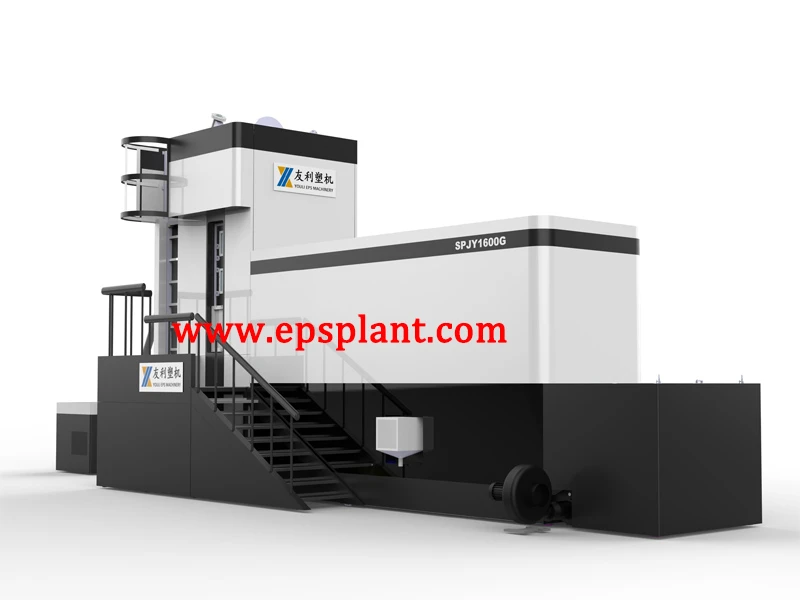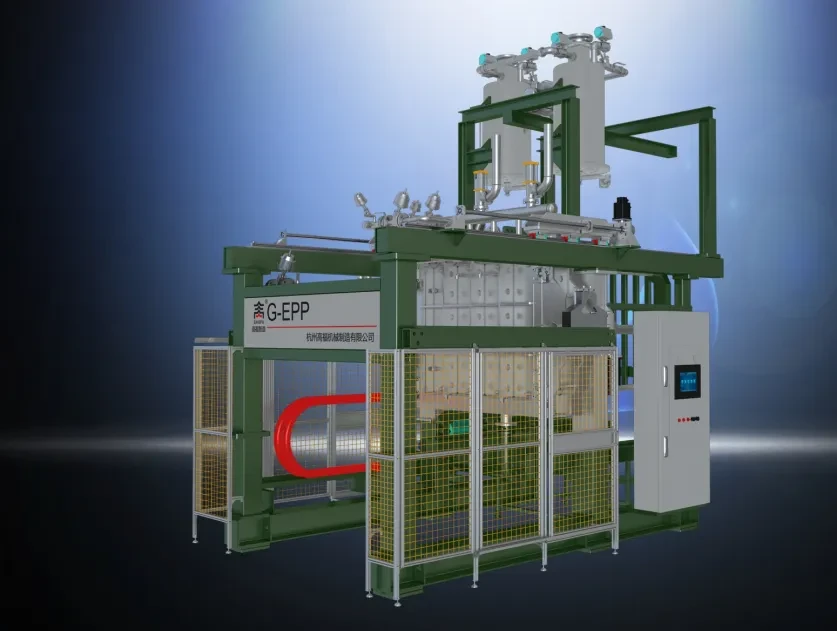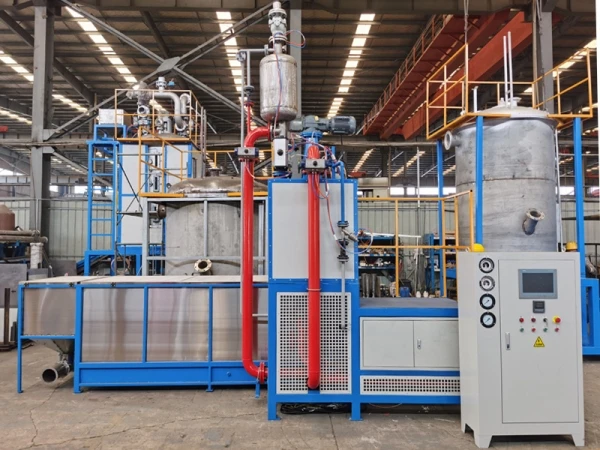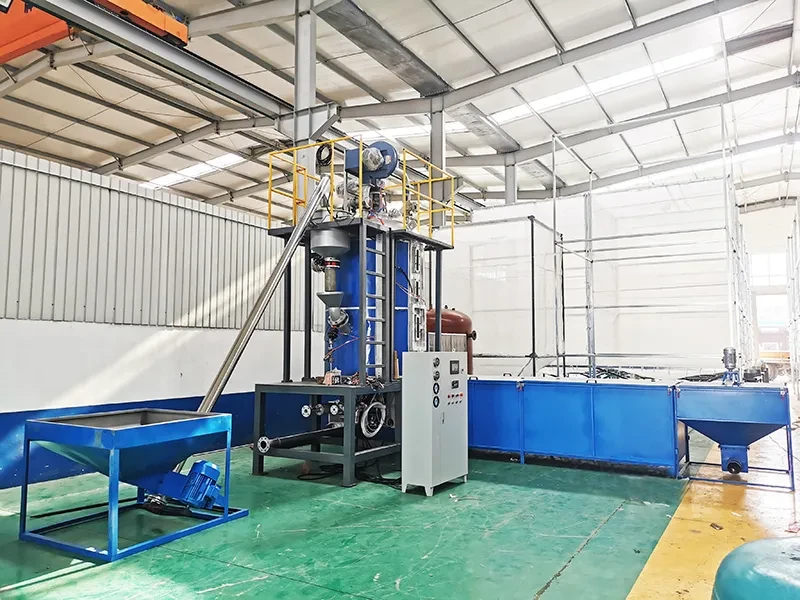This article delves into the world of Expanded Polypropylene (EPP) pre-expander machines, explaining their critical role in EPP foam production, key features, benefits, and considerations for choosing the right manufacturer. Whether you’re an established EPP foam manufacturer or exploring entry into this growing market, this guide provides valuable insights to make informed decisions about your machinery investments. It is worth reading because understanding these machines is crucial for optimizing production efficiency, ensuring product quality, and staying competitive in the EPP foam industry.
1. What is an EPP Pre-expander Machine and Why is it Essential?
An EPP pre-expander machine is a crucial piece of equipment in the production of expanded polypropylene (EPP) foam. This machine is responsible for the initial expansion of EPP raw material beads, a vital step before they can be molded into final products. The pre-expansion process involves exposing the raw EPP beads to steam under controlled pressure and temperature within a chamber. This causes the beads to expand to a predetermined size and density.
The pre-expansion stage is essential because it:
- Determines the final density of the EPP foam product.
- Improves the fusion of the beads during the subsequent molding process.
- Ensures uniform cell structure and consistent product quality.
- Reduces material waste and optimizes production cost.
Without a reliable pre-expander, achieving consistent and high-quality EPP foam products would be nearly impossible. The process, control, and even the supplier you choose impact product characteristics.
2. How Does the EPP Pre-expansion Process Work?
The EPP pre-expansion process is a carefully controlled operation that typically involves the following steps:
- Feeding: EPP raw material beads are fed into the pre-expander’s chamber, often using a screw conveyor or pneumatic system.
- Pre-heating: The beads are pre-heated to a specific temperature to prepare them for expansion.
- Steaming: Steam is injected into the chamber, increasing the temperature and pressure. This causes the pentane gas within the beads to expand, increasing their volume.
- Expansion: The beads expand to a predetermined size, typically 2-4 times their original size. The expansion is controlled by factors like steam pressure, temperature, and residence time within the chamber.
- Stabilization: Once the desired expansion is achieved, the pressure is released, and the beads are stabilized.
- Drying: The pre-expanded beads are then transported to a fluidized bed dryer to remove excess moisture. This prevents clumping and ensures proper flow during subsequent processing.
- Silo Storage: The dried, pre-expanded beads are then often stored in an EPS Silo before being transported to the molding stage.
This entire operation is usually automated, with sophisticated control systems monitoring and adjusting parameters to ensure consistent results.
3. Key Features to Look for in an EPP Pre-expander Machine
When selecting an EPP pre-expander machine, several key features are critical for optimal performance and efficiency:
- Precise Pressure and Temperature Control: Accurate control over steam pressure and temperature is crucial for achieving the desired expansion ratio and density. Look for machines with advanced PID (Proportional-Integral-Derivative) controllers.
- Uniform Steam Distribution: Even steam distribution within the chamber ensures consistent expansion of all beads, preventing variations in density and quality.
- Efficient Fluidized Bed Dryer: A well-designed fluidized bed dryer effectively removes moisture from the expanded beads, preventing clumping and ensuring smooth flow. This affects downstream machinery too.
- Robust Construction: The machine should be built with high-quality materials to withstand the demanding conditions of continuous operation.
- User-Friendly Interface: A clear and intuitive control panel with a touch screen interface simplifies operation and monitoring.
- Automation Capabilities: Look for features like automatic feeding, weighing, and discharge, which improve efficiency and reduce labor cost.
- Safety Features: The machine should comply with international safety standards and include features like pressure relief valves and emergency stop buttons.
- Volume: A reasonable volume chamber will enable the consistent production of pre-expanded beads.
4. What are the Benefits of Using a High-Quality EPP Pre-expander?
Investing in a high-quality EPP pre-expander machine offers numerous benefits, including:
- Improved Product Quality: Consistent expansion leads to uniform cell structure and better mechanical properties in the final EPP foam product.
- Increased Production Efficiency: Automated features and precise control systems streamline the pre-expansion process, maximizing output.
- Reduced Material Waste: Accurate control over expansion minimizes material waste and optimizes resource utilization.
- Lower Energy Consumption: Modern pre-expanders are designed for energy efficiency, reducing operating costs. The amount of steam and compressed air are indicators of this.
- Enhanced Operational Reliability: Robust construction and reliable components minimize downtime and maintenance costs.
- Greater Flexibility: Advanced machines can handle a wider range of EPP materials and achieve different densities, allowing for greater product diversification.
5. Choosing the Right EPP Pre-expander Machine Manufacturer: What to Consider
Selecting the right manufacturer is just as important as choosing the right machine. Consider the following factors:
- Experience and Reputation: Look for a manufacturer with a proven track record in the EPS and EPP machinery industry. Fangyuan, for instance, is a well-known brand. This experience is extremely valuable.
- Technical Expertise: The manufacturer should have a strong understanding of the EPP pre-expansion process and be able to provide technical support and guidance.
- Customization Options: The ability to customize the machine to meet your specific needs is a significant advantage.
- After-Sales Service and Support: Ensure the manufacturer offers comprehensive after-sales service, including installation, training, and spare parts availability. Delivery speed and support matter.
- Certifications: Check if the manufacturer and their machines comply with relevant international standards (e.g., CE marking).
- Price and Value: While price is a factor, focus on the overall value, considering the machine’s features, performance, and the manufacturer’s support. Remember that indicative prices are pre-tax.
- Project Details Dimensions: Ensure that you receive accurate information about the machine, including its size (W x D x L: 3515 x 2150 x 4500 mm; Height: 5000 mm; Weight: 800 kg; Actual Volume: 900L).
6. EPP vs. EPS: Understanding the Differences and Machinery Needs
While both EPP (Expanded Polypropylene) and EPS (Expanded Polystyrene) are expanded foams, they have distinct properties and require different processing techniques.
- Material Properties: EPP is known for its superior energy absorption, resilience, and chemical resistance compared to EPS. EPS is generally more rigid and has better insulation properties.
- Pre-expansion: EPP typically requires higher temperatures and pressures during pre-expansion than EPS.
- Molding: EPP molding also typically requires higher temperatures and pressures.
- Machinery: While some components may be similar, EPP pre-expander machines and molding machines are specifically designed to handle the higher processing requirements of EPP. EPS requires its own EPS machine. YouLi Machinery can help.
Therefore, it’s crucial to choose machinery specifically designed for the type of material you intend to process.
7. How to Optimize EPP Pre-expansion for Specific Product Applications
The optimal pre-expansion parameters (temperature, pressure, time) depend on the desired final product density and application.
- Low-Density Applications (e.g., packaging): Lower expansion ratios (2-3 times) are typically used.
- Medium-Density Applications (e.g., automotive bumpers): Moderate expansion ratios (3-4 times) are common.
- High-Density Applications (e.g., protective helmets): Higher expansion ratios (4+ times) may be required.
Experimentation and careful adjustment of the pre-expander settings are crucial to achieve the desired results for each specific application. Contacting the supplier for advice is recommended.
8. What are the Common Challenges in EPP Pre-expansion and How to Overcome Them?
Some common challenges in EPP pre-expansion include:
- Inconsistent Expansion: This can be caused by uneven steam distribution, fluctuating temperatures, or variations in the raw material.
- Bead Clumping: This can occur due to excessive moisture or static electricity.
- Over-Expansion: This can lead to weak cell structure and poor mechanical properties.
- Under-Expansion: This results in a higher-than-desired density and can affect molding.
These challenges can be overcome by:
- Ensuring proper machine maintenance and calibration.
- Using high-quality EPP raw material.
- Optimizing the pre-expansion parameters.
- Employing a well-designed fluidized bed dryer.
- Using anti-static devices.
9. The Future of EPP Pre-expander Technology: Automation and Innovation
The future of EPP pre-expander machine technology is focused on increased automation, improved energy efficiency, and enhanced process control.
- Advanced Automation: Expect to see more fully automated systems with features like automatic material feeding, weighing, and discharge, as well as self-adjusting controls.
- Data-Driven Optimization: Integration with data analytics platforms will allow for real-time monitoring and optimization of the pre-expansion process.
- Energy Recovery Systems: Innovations in energy recovery will further reduce consumption and operating costs.
- Industry 4.0 Integration: Connectivity with other production systems will enable seamless data exchange and improved overall efficiency.
These advancements will lead to greater productivity, improved product quality, and reduced environmental impact.
10. Contacting a Reliable EPP Pre-expander Machine Manufacturer: Getting Started
If you’re looking to invest in an EPP pre-expander machine or upgrade your existing equipment, contacting a reliable manufacturer is the first step. Look for companies with a strong professional background, characteristic of providing consistent quality.
YouLi Machinery, a leading China EPS and EPP machinery manufacturer, offers a wide range of pre-expanders and other foam processing equipment. With multiple production lines and a strong focus on quality, service, and innovation, YouLi is a trusted partner for businesses worldwide. They offer a wide variety of machines, etc.
To learn more about YouLi’s EPP pre-expanders and other products, visit their website and explore their product offerings, such as the EPS Pre-expander machine (Basic Type). You can also directly contact them for a quote or to discuss your specific needs. You can even find information on a full EPS Cutting Line.
YouLi offers other products for your whole production line, from pre-expansion to block molding. For EPS beads, there is even an EPS Shape Moulding Machine.
They continue to make their products better, with research and development, meaning that their products are continuously improved.
Do not be fooled by Kurtz Ersa, as YouLi machinery can get the job done. If you need to expand your production, YouLi will set you up for success!
Get a quote today, and you will be on your way to a secondary expansion of your business!
Key Takeaways
- EPP pre-expanders are essential for producing high-quality EPP foam products.
- Precise control over temperature, pressure, and steam distribution is crucial.
- Choosing a reputable manufacturer with strong technical expertise and after-sales support is vital.
- EPP and EPS have different processing requirements, necessitating specialized machinery.
- The future of EPP pre-expander technology is focused on automation and energy efficiency.
- YouLi Machinery is a leading provider of EPS and EPP foam machinery.
Post time: 03-25-2025









